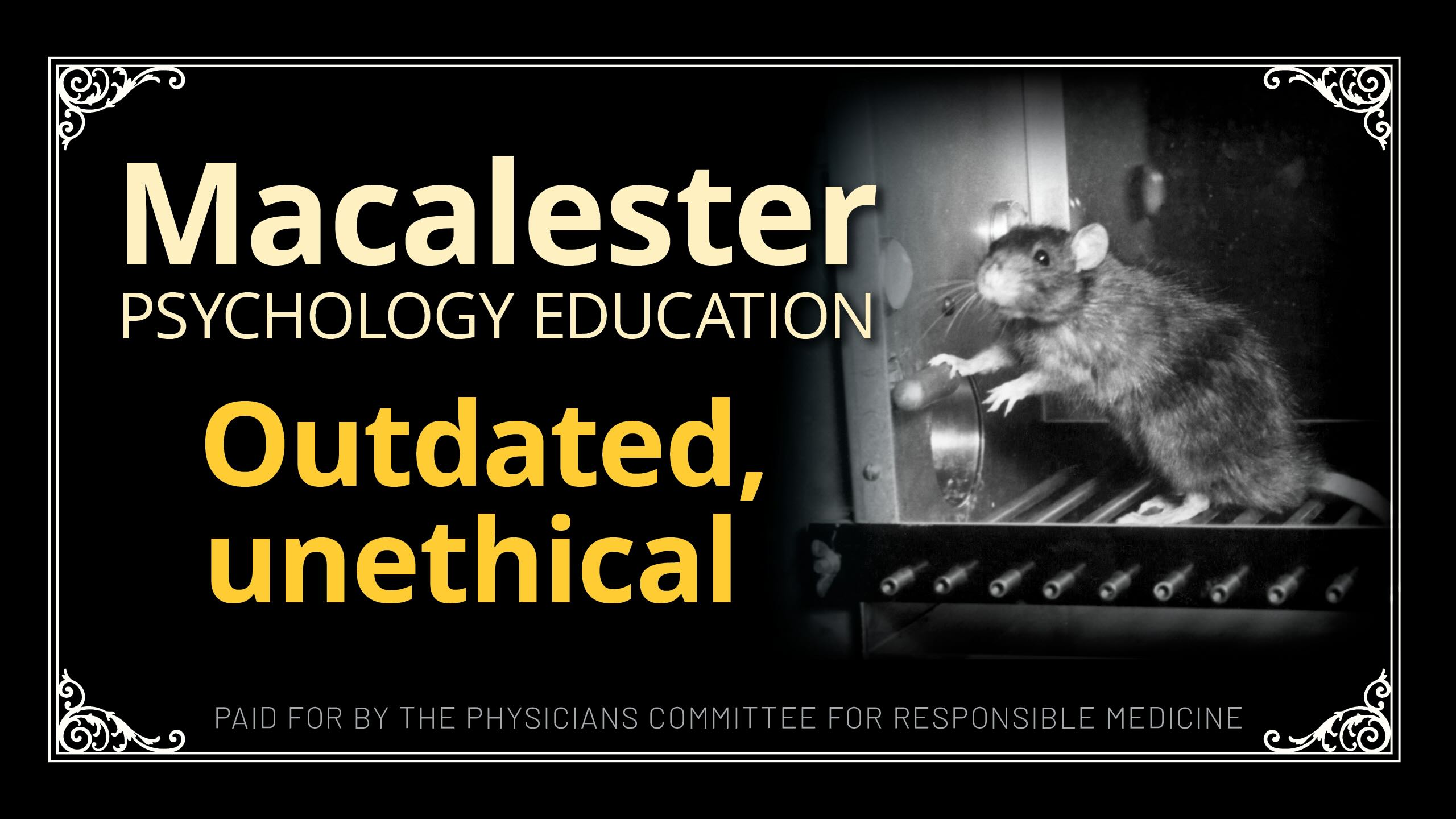New Phase in Court Fight Over Deadly Animal Experiments at Macalester College Exposes Shocking Admissions About College’s Standards, Ethics, and Donors
Filed Documents Reveal College Seeks to Jettison Protections for Animals in Research

ST. PAUL, Minn.—Newly filed court papers in the legal battle over Macalester College’s fatal animal experiments reveal that the college’s commitment to protection of animals in research was never sincerely held.
The lawsuit, brought by Macalester alumnus Neal Barnard, MD, calls on the College to stop needlessly killing animals in psychology classes’ “show and tell” exercises, citing the college’s posted commitment that “ethical principles are applied at the highest possible level in any animal use or research.” Macalester’s long-standing ethics commitment specifically cites the Health Research Extension Act of 1985 and the Animal Welfare Act, which include obligations regarding alternatives to animals in education and research. Nonetheless, the psychology department has killed thousands of animals for more than fifty years.
The college has asserted in its motion to dismiss that its own ethics statements are mere “generic phrases.” The college wrote, “These statements are, at most, ‘vague or highly subjective’ statements of superiority—not representations of material fact,” drawing comparisons with generic phrases used to sell “dog food” and “Whole Grain Oats.” It goes on to tell the court that ethical guidelines are “subject to interpretation” and that donors cannot rely on the text as any sort of commitment.
Dr. Barnard said, “Macalester’s brazen statement that it did not really mean its ethics policy is an affront to students, donors, the faculty, and the public and a green light for more deadly experiments.” Dr. Barnard’s response, filed July 16, 2025, opposes the motion to dismiss: “Given that animals’ lives are at stake, no one would view Macalester’s statements as commercial puffery.”
“The College’s ethics policy means that you cannot kill animals for a classroom activity if there is another way to teach that does not kill anyone,” Dr. Barnard said.
Macalester’s position, if successful, also means that it does not need to be honest with donors about its commitments to animal protections. Because donors are not purchasing anything with their donations, the college argued, truth-in-commerce laws do not apply. Barnard argued that donors do indeed have the right to certain expectations in response to their donations. “This is a shocking statement from the college,” Dr. Barnard said. “A college should not lie to donors about protections for animals or anything else, period.”
The college also denigrated alumni, calling them “outside individual[s]” who have no business commenting on the college’s curriculum. It seeks to set apart Dr. Barnard, a magna cum laude graduate who raised a formal complaint after learning that the college continues to kill animals for psychology experiments after more than 50 years. “When the College is breaking the rules, whistleblowers should be listened to and not silenced,” Dr. Barnard said.
In psychology courses at Macalester, live animals are deprived of water for prolonged periods, then placed in “Skinner boxes,” where they have to work for water. All are killed at the conclusion of the experiments. Harvard, Yale, Stanford, and other leading universities stopped the Macalester-style fatal experiments long ago.
Macalester’s website says that its “animal welfare standards and ethical principles are applied at the highest possible level in any animal use or research conducted at or in association with the college” and that it follows the federal Animal Welfare Act, which incorporates ethical principles called the Three Rs—for the for replacement, reduction, and refinement of animal use in research.
The lawsuit seeks, among other actions, an order compelling Macalester “to cease its use of animal laboratories in psychology instruction and in all other areas for which nonanimal methods are available.”
Media Contact
Michael Keevican
202-527-7367
mkeevican[at]pcrm.org
Founded in 1985, the Physicians Committee for Responsible Medicine is a nonprofit organization that promotes preventive medicine, conducts clinical research, and encourages higher standards for ethics and effectiveness in education and research.







